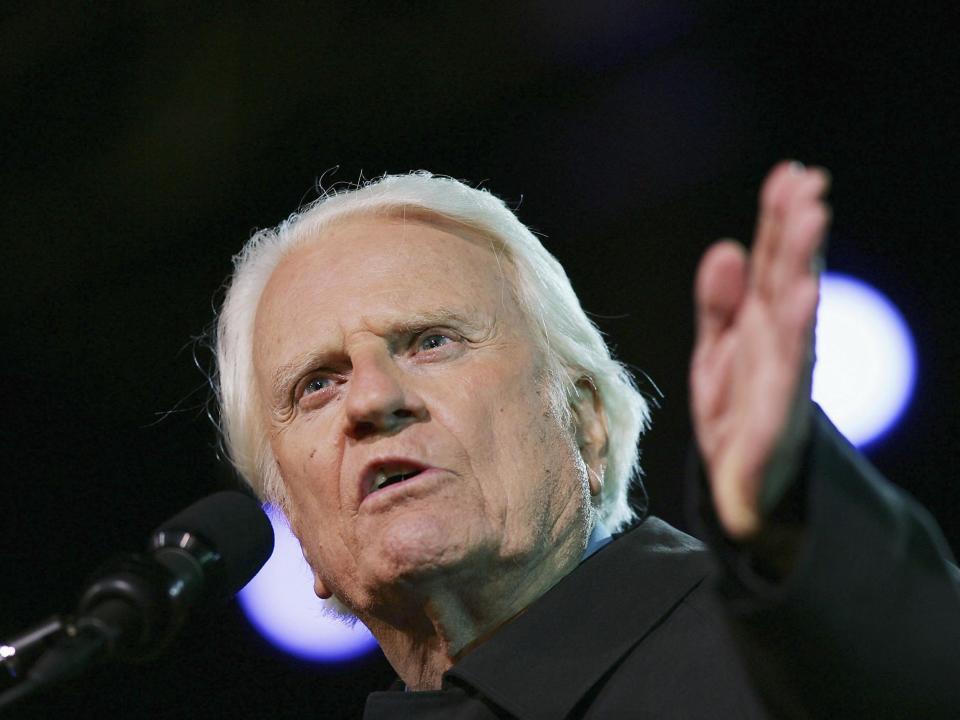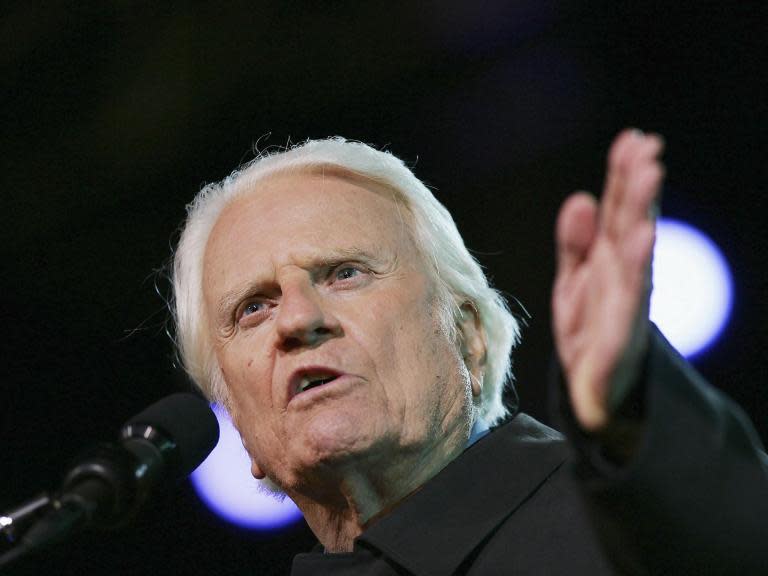The outpouring of grief for evangelist Billy Graham is disturbing given his homophobic views
Billy Graham, a well-known American evangelical Christian, has died. There has been an outpouring of emotional tributes, from many media outlets as well as various high-profile individuals.
One such came from Archbishop Justin Welby: “Dr Billy Graham stood as an exemplar to generation upon generation of modern Christians.” Barack Obama cited the “hope and guidance” that Graham had given to “generations of Americans”, while Trump was characteristically succinct: “The GREAT Billy Graham is dead. There was nobody like him!”
Such reverence is quite peculiar, especially considering some of the views which Graham propounded in the name of his religion.
Let’s consider for a moment his attitude towards gay people, illustrated rather well by an exchange of letters in 1974. A woman wrote to Graham, asking him about the love she felt for another woman. He began by quoting Paul’s letter to the Corinthians: “Make no mistake: no fornicator or idolator, none who are guilty either of adultery or of homosexual perversion … will possess the kingdom of God” (1 Corinthians 6:9).
He added that homosexuality was an “ungodly spirit of self-gratification” and famously went on to say “we traffic in homosexuality at the peril of our spiritual welfare. Your affection for another of your own sex is misdirected and will be judged by God’s holy standards.”
The website of the Billy Graham Evangelistic Association (BGEA) continues this legacy, with a section on “Homosexual Relationships”, stressing that marriage should only take place between a man and a woman, according to the doctrine of the Book of Leviticus.
Graham was a firm believer in the power of so-called gay cure therapy, encouraging contact with groups such as the (now-defunct) Exodus International. The BGEA has a whole page dedicated to the idea that being gay is something that can be changed, which ends with a reference to a “practical guide to overcoming homosexuality”.
The website also features a story about the power of “gay conversion therapy” (under the more palatable euphemism of “deliverance”). The story of Kathy Simonini is featured – a woman who now “loves ministering to young adults who are confused by the lies of homosexuality”. In the article, she explains: “God didn’t make you this way. The enemy is feeding you lies and you’re watching society, which is convincing you in your mind. Block out the world and go to Him.” Her views are now what most people would consider to be violently homophobic – “as I got to know my Lord and Saviour, [the homosexual lifestyle] makes me sick to my stomach to be quite honest”. I can’t help but feel profoundly sorry for her.
Being gay is not an illness, yet to this day gay people in the UK are still offered “therapies” to cure themselves. This often involves electroshock, starvation and prayer therapy. This dangerous practice is not yet illegal in the UK, despite all major psychological bodies ruling it not only ineffective but also harmful.
I won’t linger too much on the oft-cited reference to Aids that Graham made in a sermon in Columbus, Ohio, where he appeared to answer his own question: “Is Aids a judgment of God? I could not say for sure, but I think so.” This did lead to a huge backlash at the time, and he later retracted the statement, but the sermon had been delivered to a record-breaking crowd of 44,300 in Cooper Stadium and it’s a pretty safe bet that they didn’t all hear the retraction.
I would also rather not linger on the infamous “Billy Graham Rule” – more recently the “Pence Rule” – which advocates that men avoid meeting, travelling or eating with a woman, other than one’s wife, alone, as a way of preventing infidelity or even the “appearance of evil”. It has come to be widely embraced by evangelicals over the past sixty years, which I find quite astonishing. Sexually speaking, I find myself drawn to men, and yet so far I’ve managed to avoid sleeping with the vast majority of those with whom I’ve shared an innocent curry or a long car journey. Maybe Dr Graham didn’t have my iron will.
Bearing all this in mind, I cannot help but be deeply troubled by comments like that of Archbishop Welby. Surely Graham, far from being “an exemplar to generation upon generation”, is an example of how religion is so often successfully leveraged as a means of making bigotry appear somehow acceptable, even something to aspire to.
There is an insidious belief that Christianity is somehow inherently “good”, that belief in a God or having “faith” is something to admire and aspire to. Billy Graham has reminded me – as someone who was brought up in Christianity – why it is not that simple.
My pastor once wrote to me, suggesting that I “pray to God for deliverance” and that he would “make my paths straight”. The untold mental damage wrought by that kind of advice has had long-reaching effects on my own life, and continues to impact the lives of thousands of LGBT+ people born into fundamentalist religious families. Graham is enjoying almost cultish levels of posthumous adulation from many quarters. It is unprecedented; and to my eyes, it is disturbing and wilfully blind.

 Yahoo News
Yahoo News 

